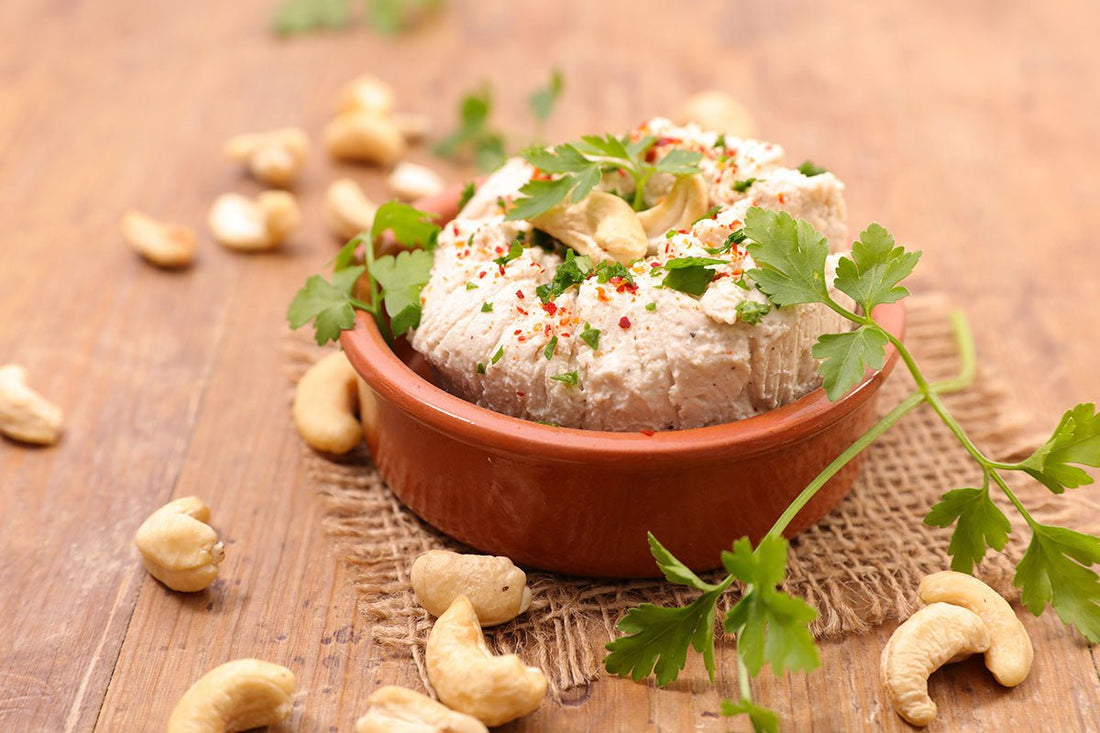
The Culinary Delights of Cashew Cheese: A Vegan Favorite
Share
Cashew cheese has become a beloved staple in the world of vegan cuisine, offering a creamy texture and rich flavor reminiscent of traditional dairy cheese. Made from raw cashews and a few simple ingredients, cashew cheese is not only delicious but also versatile, making it an ideal substitute for dairy cheese in a wide range of dishes. In this article, we'll explore the culinary delights of cashew cheese, its nutritional benefits, and how to incorporate it into your favorite vegan recipes.
1. The Appeal of Cashew Cheese
Cashew cheese has gained popularity among vegans and dairy-free individuals for several reasons:
Creamy Texture: When blended, soaked cashews become smooth and creamy, closely mimicking the texture of dairy cheese.
Rich Flavor: Cashews have a naturally buttery and nutty flavor, which adds depth and richness to cashew cheese.
Versatility: Cashew cheese can be flavored and seasoned in countless ways, allowing for a wide variety of cheese styles, from tangy and sharp to mild and herb-infused.
Melting Properties: Cashew cheese melts beautifully when heated, making it suitable for use in recipes such as grilled cheese sandwiches, quesadillas, and pizza.
2. Nutritional Benefits of Cashew Cheese
In addition to its delicious taste and texture, cashew cheese offers several nutritional benefits:
Healthy Fats: Cashews are rich in heart-healthy monounsaturated fats, which can help lower LDL cholesterol levels and reduce the risk of heart disease.
Protein: Cashews provide plant-based protein, making cashew cheese a satisfying and nutritious addition to meals.
Vitamins and Minerals: Cashews contain essential nutrients such as magnesium, phosphorus, and zinc, which support overall health and well-being.
3. Making Cashew Cheese at Home
Creating homemade cashew cheese is simple and requires only a few basic ingredients:
Raw Cashews: Soak raw cashews in water for several hours or overnight to soften them before blending.
Lemon Juice or Vinegar: Acidic ingredients such as lemon juice or vinegar help to mimic the tangy flavor of dairy cheese.
Nutritional Yeast: Nutritional yeast adds a cheesy flavor to cashew cheese and provides essential B vitamins.
Salt and Seasonings: Customize your cashew cheese with your favorite herbs, spices, and seasonings to suit your taste preferences.
To make cashew cheese, simply blend the soaked cashews with lemon juice or vinegar, nutritional yeast, salt, and any desired seasonings until smooth and creamy. Adjust the consistency by adding water as needed, then refrigerate the cheese to allow it to firm up before serving.
4. Using Cashew Cheese in Recipes
Once you've made cashew cheese, the possibilities are endless. Here are some ideas for incorporating cashew cheese into your favorite vegan recipes:
Spread on Crackers: Enjoy cashew cheese spread on crackers or toasted bread for a quick and satisfying snack.
Dip for Vegetables: Serve cashew cheese as a dip for raw vegetables such as carrots, celery, and bell peppers.
Stuffed into Pasta: Use cashew cheese as a filling for stuffed pasta shells, manicotti, or ravioli.
Topping for Pizza: Spread cashew cheese on pizza crust as a creamy and flavorful base, then top with your favorite vegetables and herbs.
Layered in Lasagna: Substitute cashew cheese for ricotta cheese in lasagna for a dairy-free and indulgent meal.
Mixed into Sauces: Stir cashew cheese into pasta sauces, soups, or casseroles for added creaminess and flavor.
5. Conclusion
Cashew cheese is a delicious and versatile ingredient that has become a favorite among vegans and dairy-free individuals for its creamy texture, rich flavor, and nutritional benefits. Whether spread on crackers, stuffed into pasta, or melted into sauces, cashew cheese adds a touch of indulgence to vegan dishes while providing essential nutrients and healthy fats. Experiment with making your own cashew cheese at home and explore the endless culinary possibilities of this beloved vegan staple.

